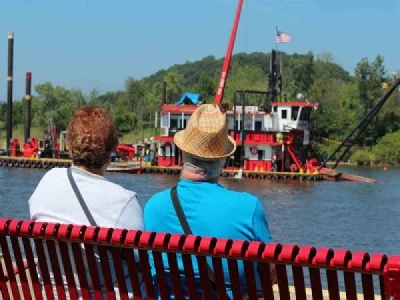
Posted on December 6, 2018
On the surface, the proposed dredging of the Grand River from Grand Rapids to Eastmanville sounds like a good idea. How cool would it be to open up the river to big boat traffic through a navigable waterway?
But when you dive into it deeper and start to think about the reality of such a thing, the economic and environmental impacts, the idea sinks to the muck like a lead buoy.
Last month, Grand Haven City Manager Pat McGinnis told the City Council that a group called the Grand River Waterway recently commissioned a study on the economic impact of dredging a 23-mile stretch of the river, from the Fulton Street Bridge in downtown Grand Rapids to the Bass River Inlet near Eastmanville. It would be 50 feet wide and 7 feet deep.
According to the study by the Anderson Economic Group LLC, such a project would result in up to $5.7 million in additional tourism spending each year and increase property values along the river.
Maybe so, but what would it cost to dredge 23 miles of the river? Our guess is that it would be a lot. And it would likely have to be done every year or two.
Who will pay for it? Look in the mirror.
It takes a lot of money to dredge nearly a mile of the channel between Lake Michigan and the drawbridge to allow those big freighters in to deliver coal to the power plant and materials to the big docks. In 2017, the last time Grand Haven’s outer harbor was dredged, the U.S. Army Corps of Engineers awarded a $208,000 contract to dig up 35,000 cubic yards from the river bottom and deposit it on the shore.
The Grand River Waterway study estimates the 23-mile stretch upriver that they propose for dredging will be about three times as much material. And the dredging area is nearly 25 times longer.
Economics aside, what are the potential environmental impacts of dredging that much river?
Digging up all that sediment from the river bottom could disturb who-knows-what. McGinnis said there could be contamination lurking beneath the first few inches of sediment and extensive sampling would be required to prevent a public health risk.
“We’ve only recently discovered the PFAS calamity,” the city manager said. “There is likely other concerns in the 100 years of industrial sediment beneath the riverbed.”
Grand Haven leaders are also concerned about flooding, threats to existing wetlands, wakes created by powerboats and keeping recently improved water trails along the river safe for kayakers. We’re also concerned what it would do to fishing.
“We have been trying to market this corridor as a natural destination for ecotourism,” McGinnis said. “Are we going to abandon this approach in favor of waterskiing and pedal pubs?”
The city is so far not taking a stance against the plans to dredge the river, McGinnis said, but they are looking for more information to prepare for such an undertaking.
That’s OK. Keeping an open mind is what we ask of our governmental leaders. But we are still skeptical that this idea has the ability to float.
Source: Grand Haven Tribune





